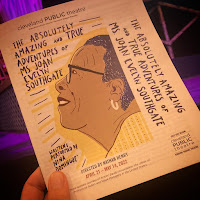 |
| This is how I always point at Jeremy. |
Saturday afternoon, I moderated a panel discussion at Cleveland Public Theatre called Considering the Source: Creating With Existing Material, presented by the Dramatists Guild as part of CPT’s annual Entry Point festival of new works.
Panelists included Nina Domingue, Eric Schmiedl, and Jeremy Paul, and we picked apart their creative process for (among other works) Nina’s The Absolutely Amazing True Adventures of Ms. Joan Southgate, Eric’s work adapting the novels of Kent Haruf, and Jeremy’s recent interactive production of Dante’s Inferno.
 |
| Nina Domingue |
I had been invited to moderate this panel a few weeks ago, a few days before mother died. I said yes. I thought it was crazy, I was fairly certain her death would come very soon, did I have any business committing to an event I may need to cancel? Would I have time for this? Where would I be in my headspace in two weeks time? I said yes.
As it turned out, it was a good decision to have made. I would have regretted saying no. Ever since January 2017, when CPT first produced Entry Point, the weekend has been a creative oasis in the midst of a dark time.
That first year I acted in someone else’s work, my eleven year-old son attended and has strong, positive memories of the works he experienced there -- and he was there because the female-identified members of our family were in Washington, D.C., taking a stand for women’s rights. To paraphrase Emile M. Cioran, “A new play is a nation’s suicide, postponed.”
Shortly before the panel began this past Saturday, Molly Andrews-Hinders, CPT Artistic Associate, asked me how my Test Flight piece was coming along, which is to say my new script The Witches. Test Flight is in April, and rehearsals begin soon. It was a perfectly supportive question, we were catching up, it was not an inquisition. But for the briefest moment, I felt like the teacher had asked about my progress on a term paper that I had not yet started.
The truth is I haven’t written a word for The Witches since November. And I do not feel guilty about that. I had made a promise to myself to complete the first draft by the end of calendar 2019. Tragedy intervened, and I told myself to leave it on the shelf awhile or else I would go mad. It will be there when I am ready to return.
When I have two assignments looming it can be difficult to concentrate on either one. When I have three, I’ll just scroll Facebook for eight hours.
Sometimes I will procrastinate on the next thing due by writing the thing that is due later, which can be very helpful as when I finally do bear down on my immediate project, at least I know I’ve made headway into the next one.
This winter I have concentrated on the very next deadline, fully aware there was one final deadline to meet before I could think about spring. These included:
- The November Witches reading draft
- The production draft of Sherlock Holmes
- Scripts for the Christmas Carol writing contest
- The Sherlock Holmes teacher resource guide
- The grad school application
- Adapting three chapters of a children’s book
- The source material panel
- The eulogy for my mother
 |
| Cleveland Public Theatre (2022) |
Another deadline met, another promise kept.











